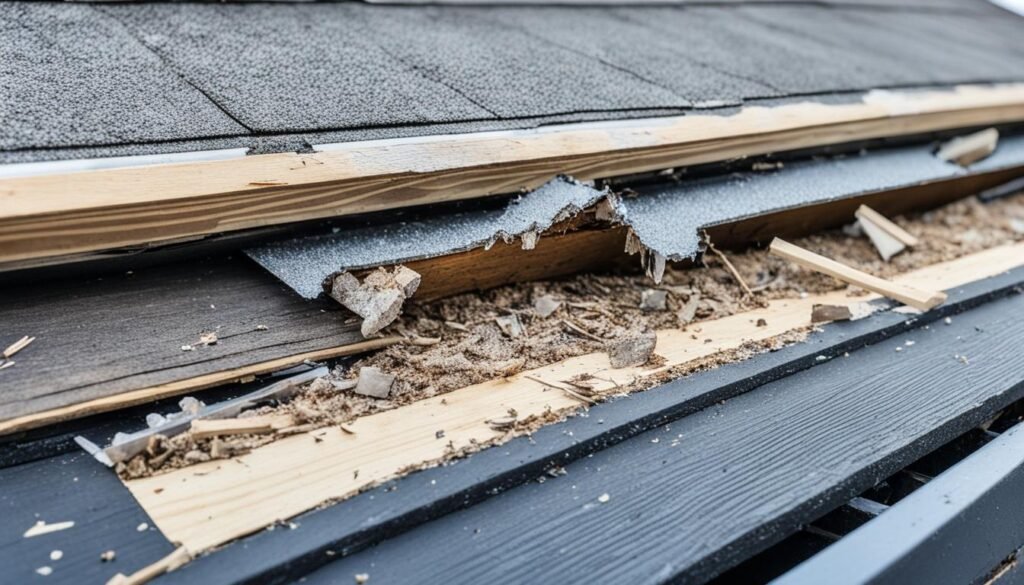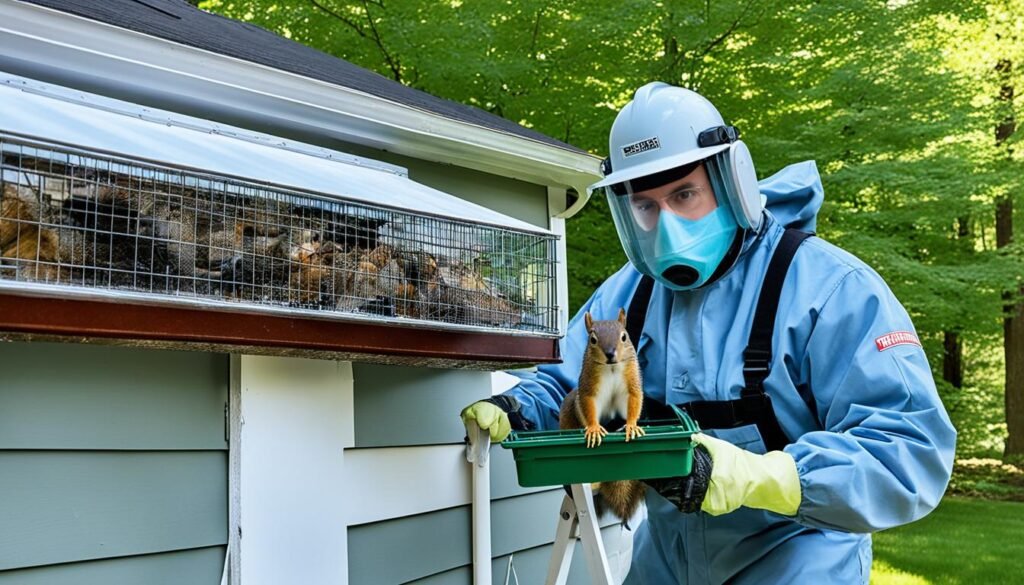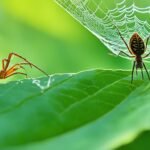Squirrels can cause big problems if you ignore them because squirrel damage to house When it gets cold, they might try to live in your house. You must act fast to keep them out. This means fixing any holes they use to get inside. Use things like foam, caulk, and wire mesh.
Check for chewed wires to avoid fires. You should also replace any insulation they ruined. Since squirrels can chew through almost anything and their droppings are unhealthy, you have to keep an eye out.
It’s important to fix any squirrel damage quickly. Often, insurance won’t cover the cost caused by these small animals. Making some changes in your house can also keep them away.
By taking these actions, you keep your home safe. It stops squirrels from damaging your place. This keeps your living space secure and comfortable.
Understanding the Risks of Squirrel Infestation
Squirrel infestations are big trouble for homeowners. They harm your house, health, and safety. These rodents are more than just annoying. They bring serious problems that need quick action.
Structural Damage
Squirrels can ruin your house by biting wood beams and roofing. They mess with insulation, making nests and leaving droppings and urine. This lowers your home’s energy efficiency, raising your bills.
They also damage the roof by chewing on the edges, creating holes. This makes the house weaker.
Health Risks
Squirrel nests can make you sick. Their waste spoils insulation, leading to health dangers. These animals might bring diseases like salmonella and leptospirosis.
They carry fleas and ticks, causing allergies and breathing problems. Cleaning these nest spots is key to keeping your house healthy.
Fire Hazards
Squirrels chewing on wires in attics is very dangerous. This can remove wire insulation, upping the chance of fires. Checking wires often and acting fast to fix problems is crucial.
To avoid danger from squirrels, always stay alert. Acting quickly can protect your home and health from these pests.
Signs of Squirrels in Your House
Finding squirrels early in your home can save you from much trouble. Look and listen for signs to catch them quickly. Knowing these signs is very important.
Visual Clues
You might see holes in your roof or walls. Look out for chewed wood or wires. These are signs of squirrels. In places with many squirrels, like Portland, check your house often.
Auditory Clues
Noises like scratching or chewing in the attic mean squirrels may be there. They look for shelter in houses if there are many in the area. Listen for these sounds in the morning and evening.
Squirrel Droppings and Urine
Finding squirrel droppings in your attic or garage is a clear sign. Droppings and a urine smell mean squirrels are near. This waste can damage your home if not cleaned up. Make sure to tell them apart from other animals’ waste.
How Squirrels Enter Your Home

Squirrels have a keen sense of finding small openings around your home. With strong teeth, they can chew through various materials. This lets them get into attics and other spaces inside.
Common Entry Points
To stop squirrels, you need to know how they get in. They often use these spots:
- Chimneys
- Attic vents
- Soffits and fascia boards
- Roof returns and ridge vents
- Siding corners
- Gutters and lead roof flanges
Vulnerable Areas Around Your Home
Checking your home often helps prevent squirrel problems. Here are steps to protect your home’s exterior:
- Look for chew marks or gaps in soffits and fascia boards.
- Check around chimneys for gaps or broken caps.
- Inspect attic vents for possible entry points.
- Use metal hardware cloth to cover ridge and gable vents.
- Watch for chew marks on gutters and roof eaves, showing possible damage.
Preventing Squirrel Infestation
Protecting your home from squirrels starts with taking proactive steps. This means doing thorough inspections, sealing up places they could enter, and managing trees well.
Inspecting Your Home
Always inspect your home for damage or possible ways in for squirrels. Check for holes, cracks, or weak spots on your roof, attic, and walls. Special attention should be paid to fascia boards and attic vents since squirrels can chew through them.
Sealing Entry Points
Once you find ways squirrels could get in, close them quickly. Use strong materials like foam insulation, caulk, wire mesh, and glue to seal gaps. Remember, squirrels can fit through tiny spaces, so close every gap well to keep them out.
Tree Management and Trimming
Tree management and tree trimming are key to stop squirrel infestations. Squirrels use branches to get onto roofs and into attics. Cut back branches far enough so squirrels can’t jump from them to your house.
To make your home less attractive to squirrels, remove food sources and nesting materials like leaves and twigs. Adding squirrel repellents to these steps helps create a strong defense against these critters. These efforts help protect your home from damage caused by squirrels.
Effective Squirrel Repellents
Dealing with squirrels can be quite tough. Luckily, there are many squirrel repellents to help solve this problem. You can choose from store-bought or homemade options to keep squirrels away.
Commercial Repellents
At your local home improvement store, you’ll find commercial repellents. They often have capsaicin, the spicy part of cayenne peppers. It works by bothering their senses. You can buy these repellents as sprays, granules, or ultrasonic devices. For the best effect, reapply them every few weeks.
Homemade Repellents
If you like making things yourself, homemade repellents are a great pick. Mix cayenne pepper sauce, water, and dish soap. Spray this on places where you see squirrels often, like on wood, doors, or shutters. Don’t forget to reapply it regularly to keep it working well.
Proper Application
The success of any squirrel repellent, store-bought or DIY, rests on how you apply it. Make sure to cover the target areas thoroughly. Also, refresh the repellent every few weeks. Keeping up with inspections and sealing off entrances is key for long-term squirrel control. This way, you’ll keep your home safe and squirrel-free.
Steps to Remove Squirrels Safely

Dealing with a squirrel that wasn’t invited needs careful methods for safe removal. These animals can be a health risk and get inside through small spaces. It’s important to act fast because squirrels breed twice a year.
Professional Removal
Getting help from pros is usually the best choice. Teams from wildlife removal services can get rid of squirrels and nests cleanly. They know how to trap squirrels live, which is key when squirrel families need moving in breeding season.
These experts also deal with squirrel diseases like encephalitis and rabies. Hiring them means not just catching the squirrels but also cleaning up nests and keeping more from coming back.
Using Traps
If you decide to do it yourself, live-trapping is a kind way to catch squirrels. These traps catch them without hurting them, so you can move them safely. Remember to check the traps often to keep the squirrels from getting too stressed. Using things like loud noises or cider vinegar can also push them to leave.
Always check your traps well. Once you see less squirrel activity, make sure to close up any ways they can get in. This helps avoid having to deal with squirrels again. For those doing this on their own, The Spruce has good advice and tips.
To sum it up, whether you get pros to help or catch the squirrels yourself, use methods that are kind and work well. Dealing with squirrels quickly and in the right way keeps your place safe and free of pests.
Repairing Squirrel Damage to House
Fixing squirrel damage to your house is key to keeping it safe and sturdy. It’s crucial to repair any harm done by squirrels to stop more problems. After kicking these critters out, repairs must start right away.
Fixing Holes and Structural Damage
Squirrels often chew into roofs and walls, which can harm your house. It’s important to cover these holes quickly. Use things like foam insulation and wire mesh to keep them out.
Make sure every little space is sealed tight. Even small gaps can let squirrels back in. Paying close attention to sealing helps prevent future entries.
Replacing Chewed Wires
Chewed wires from squirrels are a big fire risk. They like to bite electrical wires, which is dangerous. Getting a certified electrician to check and fix any damaged wires is key.
Quick action is important to avoid fires and keep your home safe. Replacing bad wiring right away helps protect your family and home.
Restoring Insulation
Squirrels in attics can ruin your insulation by moving and squishing it. This messes up its ability to work right. To fix it, you need to take out the bad insulation and put in new stuff.
It’s often best to get professionals for this job. They have the right tools and know how to stay safe. Fixing your insulation makes your home more energy-efficient and healthier.
Quickly fixing squirrel damage keeps small problems from getting worse. Homeowners should mix doing it themselves and getting professional help for best results.
Long-Term Squirrel Control Strategies
To control squirrels long-term, you need a solid plan and steady effort. It’s important to keep an eye out for ways squirrels might enter. Always check your property for damage like chewed parts or torn wires.
Squirrel-proof steps, like placing metal mesh over vents, help keep them out. Modifications around your house also matter. Trim tree branches near your home and secure trash bins to cut off their food.
Using repellents that last a while is important. This includes things that smell like predators or spicy capsaicin to deter squirrels. Be alert for any new signs of squirrels, like noises or droppings, to act fast.
Working with experts in pest control might be your best bet. Companies like Critter Stop know how to keep your house safe. They follow laws about wildlife while helping you.
Sticking with these control methods, focusing on habitat changes and repellents can keep your house free of squirrels. This means no more damage to fix.
When to Call a Professional Exterminator
Knowing when to call a pro exterminator is key for handling squirrel problems. Minor issues might be fixed with DIY methods. Yet, serious cases need professional help.
Severity of Infestation
If squirrels have made themselves at home in your attic or insulation, it’s bad. They can damage your house’s parts like siding and wiring. Pest control experts are needed to tackle the damage and safely remove nests.
Persistent Issues
Sometimes, squirrels keep coming back despite your efforts. At this point, calling a wildlife expert is wise. They find hidden entry points and use effective ways to keep squirrels out. For tough cases posing dangers to your home and health, professional help is crucial.
- Evaluating the damage squirrels have caused
- Employing safe, strong measures for squirrel removal
- Cleaning and sanitizing the areas squirrels affected
- Making sure squirrels don’t return in the future
Pros like Eastside Exterminators offer valuable services for tough infestations. Costs vary, but typically fall between $250 and $550. This investment in rodent control means lasting solutions. Their expertise helps keep squirrel troubles away for good.
Preventing Future Infestations
Keeping squirrels away involves a plan to block their ways in and make your place less inviting. A big step in stopping infestations is to keep your house in good shape. It’s important to check your home well to find and fix spots they can enter. Most squirrels get in through places on the roof, and vents are also a common way in.
It’s key to block these entry points to keep squirrels out. Experts say to use strong materials like metal to cover any gaps or holes in the walls and roof. This could stop about 80% of squirrel visits. Also, putting caps on chimneys is a must, since they’re another way squirrels get inside.
Cutting back trees near your home can lessen the chance of squirrels getting in. Trim branches that are too close to your roof to cut their access by about 70%. Wildlife pros also advise putting up special fences around gardens. Plus, fixing or replacing basement windows that are damaged or not sealed well can block out many squirrels.
Making your yard less attractive to squirrels is another important step. Get rid of food and places they might like to make nests. Squirrels like to make nests that are as big as a football, so it’s a good idea to frequently clean out potential nest spots.
Experts stress the need for a plan that covers everything from tree care to fixing up your home. They recommend checking your house often and taking steps to keep it safe. By doing these things, you can keep your home free from squirrel troubles.
| Entry Points | Percentage of Infestations |
|---|---|
| Rooftop Openings | 95% |
| Ventilation Ducts | 60% |
| Chimneys | 75% |
| Basement Windows | 40% |
| Tree Branches | 70% (Reduction due to pruning) |
| Sealing Openings | 80% (Reduction of intrusions) |
Conclusion
Dealing with squirrel damage is crucial for homeowners who want to keep their property safe. Squirrels, which are most active at night, sneak into homes through tiny openings. This leads to major damage and costly repairs, from hundreds to thousands of dollars.
Not only do they harm the structure, but their chewing also poses a fire risk by damaging electrical wires. Experts in squirrel removal have often seen fires caused by these rodents.
Squirrel infestations bring more than just damage to your home; they also pose health risks. These animals can spread fleas, ticks, and diseases that affect both humans and pets. Their droppings are also a health hazard, requiring careful clean-up to avoid illness.
In serious situations, calling in professionals to remove squirrels, especially baby ones, is essential. This helps control the damage and ensures the animals are treated humanely.
Homeowners need to be proactive to prevent squirrel damage. This involves regular checks on the home, sealing up entry points, and changing the surroundings to be less inviting to squirrels. Making changes to areas like attics can also help keep them away.
Since insurance often doesn’t cover rodent damage, taking steps to prevent it is key. Being alert and getting professional advice when necessary can protect your home from squirrel infestations.
FAQ
What are the most common signs of squirrels in my attic?
Common signs include nests of leaves and twigs, and holes in the roof. You might hear scratching and scurrying noises. Also, look out for squirrel droppings and urine; they’re health risks.
How do squirrels typically enter a home?
Squirrels sneak in through small openings in roofs, eaves, or vents. They can squeeze through tiny gaps to get into attics.
What preventive measures can I take to keep squirrels out of my home?
Check your home for small entry points. Seal any gaps with metal cloth, foam, caulk, or sheet metal. It’s also key to trim tree branches close to your home.
Are there effective squirrel repellents that I can use?
Yes. You can find repellents with capsaicin, which squirrels hate. Or make a homemade mix with cayenne pepper sauce, water, and dish soap. Applying it correctly is crucial.
When should I consider calling a professional exterminator?
Call an exterminator if the problem is too big, if DIY failed, or if there’s risks to health and home. They’re experts at fixing the issue and cleaning up.
What steps should I take to repair squirrel damage to my home?
To fix squirrel damage, seal openings and repair structural damage with strong materials. Replace bitten wires immediately to prevent fires. For big repairs or safety issues, get professional help.
How do I humanely remove squirrels from my home?
For humane removal, consider hiring wildlife experts or use live traps. Professionals remove squirrels safely. After, stop future visits by sealing entrances and using deterrents.
What are the long-term strategies for controlling squirrel infestations?
Regularly inspect your home and close off entry spots. Keep using repellents and cut back tree limbs. Keeping trash secure also helps keep squirrels away. Being proactive is key.
Why is it important to address squirrel damage promptly?
Fixing squirrel damage fast stops bigger, expensive problems. It prevents structure weakening and health risks from droppings. It also avoids fire dangers from chewed wires.













